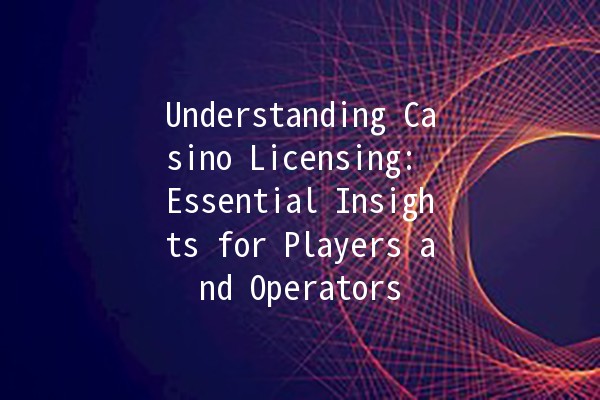The world of online gambling has witnessed significant growth, leading to a surge in interest around the concept of casino licensing. Understanding this crucial aspect is vital for both players looking to engage in safe gambling environments and operators intending to run legitimate online casinos. This article provides detailed insights into casino licensing, focusing on its importance, the types of licenses available, and practical tips for both players and operators.
What is a Casino License?
A casino license is a legal authorization granted to an online casino or gambling operator to conduct gambling activities. This license is issued by regulatory authorities in various jurisdictions and serves as a guarantee that the operator adheres to specific legal and ethical standards. Casino licensing aims to protect players, ensure fair play, and promote responsible gambling practices.

Importance of Casino Licensing
Types of Casino Licenses
Different jurisdictions offer a variety of licenses. Below are some of the most commonly recognized casino licenses:
Based in the United Kingdom, the UKGC is one of the most respected licensing authorities worldwide. The license ensures robust protection for players and strict regulatory compliance.
The MGA is wellregarded among online casinos due to its comprehensive regulations and player protection measures. It has established itself as a hub for many reputable gambling operators.
This license is often favored by many operators due to its relatively easier application process. While Curacao offers a quick licensing solution, players should exercise caution as it lacks the same level of regulatory rigor as the UKGC or MGA.
The GRA is another respected authority that ensures high standards of player protection and security. It has strict regulations that operators must follow, similar to the UKGC.
Operating from Canada, the Kahnawake Gaming Commission offers licenses to operators based in and outside of Canada. It is known for a playerfriendly approach and emphasizes accountability.
Tips for Choosing a Licensed Casino
Selecting a licensed online casino can significantly enhance your gaming experience. Here are some tips to ensure a safe choice:
Before engaging with an online casino, always verify its licensing status. Check the official website of the licensing authority to confirm that the casino holds a valid license.
Look for reviews from other players to get a sense of the casino’s reputation. Check forums and review sites that focus on online gambling experiences.
Investigate whether the casino provides information about game fairness and audits. Licensed casinos often display certifications from independent testing agencies like eCOGRA, which confirms that their games meet industry standards.
Take time to read the terms and conditions, particularly sections about bonuses, withdrawal limits, and player obligations. This understanding can prevent future disputes and clarify any uncertainties.
A reputable licensed casino should offer robust customer support. Test their response time and the various channels available (live chat, email, or phone) to resolve queries effectively.
Common Questions
What happens if a casino does not have a license?
Playing on an unlicensed casino poses significant risks, such as unfair gaming conditions, loss of funds without recourse, and lack of player protection. Always check for valid licensing to ensure a safe gaming experience.
How can I verify a casino’s licensing information?
Most reputable online casinos include their licensing information in the footer of their website. Additionally, you can visit the website of the licensing authority, where you can search for the casino's status.
Are there any benefits to playing at licensed casinos?
Yes, benefits include enhanced security for your personal and financial information, assurance of game fairness, and access to responsible gambling tools. Licensed casinos provide a safer and more secure gaming environment compared to unlicensed ones.
Can licensed casinos operate internationally?
While licensing allows casinos to operate legally within specific jurisdictions, whether they can accept players from other countries depends on local laws regarding online gambling. Always check if online gambling is legal in your country before registering.
What should I do if I have a dispute with a casino?
If you encounter an issue with a licensed casino, first try to resolve it directly with their customer support. If unresolved, many licensing authorities provide a dispute resolution service where you can escalate your complaint.
How do regulatory bodies ensure that casinos comply with laws?
Regulatory bodies conduct regular audits and inspections of licensed casinos to ensure compliance with established regulations. They also review player complaints, monitor financial transactions, and assess the overall operations of the casino.
Tips for Casino Operators Seeking Licensing
For operators considering obtaining a casino license, understanding the process is crucial. Here are key tips:
Research various licensing jurisdictions to determine which one aligns with your business model. Consider factors like tax rates, regulatory costs, and the reputation of the licensing authority.
Gather all necessary documentation to support your application, including proof of funds, business plans, and details on the software and games you intend to offer.
Familiarize yourself with the regulatory requirements specific to the granting authority. Each jurisdiction has different standards that operators must meet to obtain and maintain their license.
Demonstrating that you can secure player data and financial transactions is vital. Implement robust cybersecurity protocols and consider acquiring additional security certifications to strengthen your application.
Hiring a legal expert who specializes in gambling law can provide guidance through the licensing process. They can help navigate complex regulations and ensure compliance with all necessary legal requirements.
In the online gambling industry, understanding casino licensing is paramount for players and operators alike. For players, engaging with licensed casinos enhances security, promotes fair play, and protects their rights. For operators, obtaining a reputable casino license not only legitimizes their business but also establishes trust with potential customers. By following the insights and tips provided in this article, both players and operators can navigate the complexities of casino licensing effectively and make informed decisions that enhance their gaming experience or operational success.
In a competitive landscape, staying informed about the importance of casino licenses will empower stakeholders, fostering a safer and more enjoyable gambling environment for all.